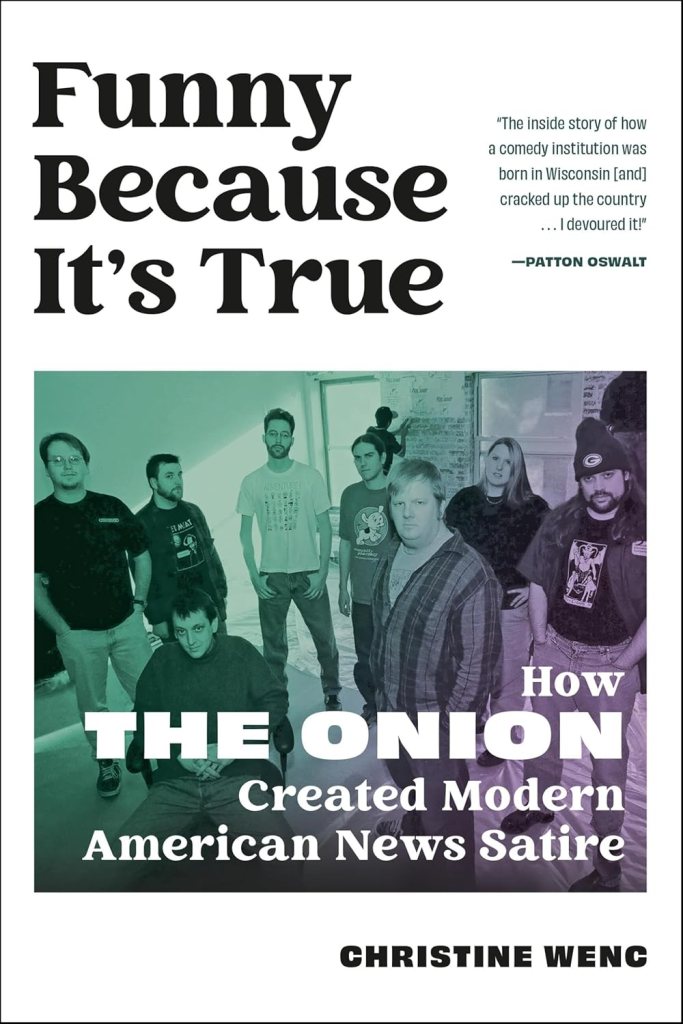
Christine Wenc.
Photo by Alexander Andre
Onion holds up mirror; society flashes big smile (with green stuff in teeth)
How some students at University of Wisconsin-Madison created satiric cultural institution

The Onion has been making fun of human folly since its founding by two undergrads at the University of Wisconsin-Madison in 1988. The mock news site has created satiric pieces so smart some believed them real, others that were just plain silly, and one headline (“‘No Way to Prevent This,’ Says Only Nation Where This Regularly Happens”) that has achieved a dark fame after being reposted after each U.S. mass shooting since 2014 Isla Vista, Calif., attack.
In this edited interview, Christine Wenc, A.M. ’08, talks about her new book “Funny Because It’s True,” on the origins of the newspaper that proclaims itself “America’s Finest News Source.” Wenc spoke about the legacy of The Onion, now based in Chicago, how it created modern news satire, and why it is revered as a cultural institution.
You were part of the original staff of The Onion. What drew you in?
I was 19 years old, and Tim Keck, who founded The Onion in 1988, was my one of my roommates. Tim was a college sophomore and the youngest child of a Midwestern newspaper family. He needed money, and with his friend Chris Johnson, decided to start a college newspaper. When they asked me to join in, I was like, “Sure” because that’s just what you do when you’re 19 years old.
Tim recruited a bunch of humanities majors, and one of them, who was an improv comedian, suggested that the paper should just be all made-up stories, and that’s how it happened. I left a couple of years later, with other staff, to become the editor of Seattle’s alternative weekly, The Stranger, which was also started by Keck.
How did The Onion develop its distinctive satirical voice?
It didn’t find its voice until later on. It was a parody of the National Enquirer in the beginning. The first headline was “Mendota Monster Mauls Madison” about a monster that had been sighted in Lake Mendota, near UW-Madison.
It was in the mid-1990s when a new staff developed that dry, satirical voice we now recognize in The Onion. Around that time, the writers argued about the paper’s mission and decided that it would critique society from a progressive point of view.
“But from the very beginning, The Onion endeavored to make fun of human foolishness. Its motto was ‘Tu Stultus Es,’ ‘You Are Dumb’ in Latin.”
The original members were from Wisconsin and shared a working-class background. Madison is known as the Berkeley of the Midwest, and it was that microclimate, a sort of Midwestern progressive underdog spirit, that infused The Onion’s satire.
But from the very beginning, The Onion endeavored to make fun of human foolishness. Its motto was “Tu Stultus Es,” “You Are Dumb” in Latin.
The Onion’s intent was never to be political. The point was to entertain, but its humor had to follow certain rules, such as we don’t make fun of women, we make fun of sexism; we don’t make fun of Black people, we make fun of racism. Pointing out things like racism and sexism was pointing at humans being stupid.
There have been cases in which The Onion’s satire was not understood, and some readers believed those made-up stories to be true. Was that a concern?
We were always aware that there were people who couldn’t tell the difference between The Onion’s news satire and real news. There are stories that were clearly jokes that were believed to be real.
For example, a piece that the Chinese media picked up about the U.S. Congress demanding to build a new Capitol; another on how the Harry Potter books were responsible for increasing Satanism; and one that announced the opening of a $8 billion Abortionplex by Planned Parenthood. The latter was reposted by a conservative politician.
Satire is a literary art form, and The Onion writers were a bunch of creative, artistic, progressive weirdos who were working outside the system and kept an independent point of view, which allowed them to see things that others couldn’t or didn’t want to see.
For instance, The Onion didn’t fall for the false claim of weapons of mass destruction during the Gulf War; headline after headline, it made fun of it while the mainstream media acted like court stenographers repeating what they were being told by the administration. It turned out that The Onion was correct.
Recent real news headlines look like they have come out of The Onion. What can a satirical newspaper do when reality seems so bizarre?
Right now, the real world indeed seems like an Onion headline because people in the real world are behaving like people in Onion stories. There is a level of respect or propriety that has just been erased in the behavior of a lot of public figures.
On the other hand, I think The Onion’s success lies in its unique kind of humor, which juxtaposes a straight news format that faithfully mimics the dry style of an Associated Press story and ridiculous content. It’s the juxtaposition between the matter-of-fact tone and the crazy stories that makes it funny. What The Onion does is news satire — good fake news — to point at the wrongs of the world to make it better. The Onion never did fake news, which is manufactured as propaganda to sow chaos and make people afraid.
What impact do you think The Onion has had on modern news satire?
“Satire has always used humor to point out the world’s injustices.”
It helped create American modern news satire. Satire has always used humor to point out the world’s injustices. It’s one of the few rhetorical devices that is effective against spin or manipulation. By poking fun at the flaws of humans and society, satire just has a way to expose the absurdities of life. It’s more than telling jokes.
The Onion is held in very high esteem in the comedy world. Many Onion writers have gone to work for comedy shows, including Jon Stewart’s “Daily Show” and “The Colbert Report” and others.
I’m glad to see The Onion alive. First, it was Generation X, which started The Onion, then the millennials behind the Onion News Network, a spoof of CNN and Fox News. Ben Collins, The Onion CEO, keeps saying that The Onion can say stuff in a way that the real news can’t. And that, to me, is part of the progressive tradition that inspired the original founders.
I think that humor and satire can also be survival mechanisms and a morale builder. Which is not nothing, especially in difficult times. Satire says that you are not the only one who thinks what’s going on is ridiculous — and it is always helpful to know you are not alone.




